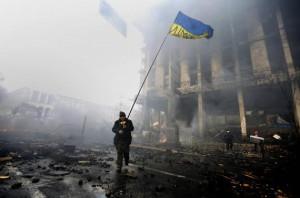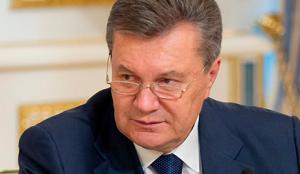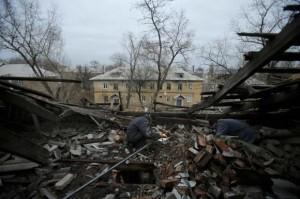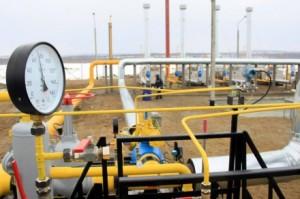Why Ukraine’s revolution remains unfinished

Reuters — In the afternoon of February 20, after the morning’s dead had been cleared away, Volodymyr Melnychuk arrived outside Kiev’s October palace.
Higher up the hill stood the seats of Ukrainian government, defended by thousands of police. Below lay Independence Square, or Maidan, covered in protesters’ camps and scarred with barricades and the detritus of battle.
In fierce clashes that morning scores of protesters and government forces had been killed. Calm now prevailed, and Melnychuk, a handyman who helped build barricades at the protests, had arranged to meet a friend at the palace’s white portico.
A bullet hit him as he stood next to his partner of 13 years, Maria Kvyatkovska. The shot entered Melnychuk’s left cheek and exited near the back of his neck, felling him instantly.
“He was chatting on the phone, just standing there. The sun was shining,” recalled Kvyatkovska, an accountant. “It was calm in the Maidan. Nobody expected it.” Melnychuk, 39, was declared dead that night.
Like many Ukrainians, Melnychuk and Kvyatkovska had first gone to the Maidan late last year because they wanted their country to forge closer ties with the European Union. They were angry that President Viktor Yanukovich had rejected a Ukraine-EU treaty and pursued closer links with Russia instead.
When police beat protesters soon after the demonstrations started, Kvyatkovska’s views had hardened. “It wasn’t about the EU” after the beatings, she said. “It was anger about power.” She realized that real change would require a complete overthrow of a corrupt system that favored a small elite and wealthy oligarchs.
Eight months on, she and millions of other Ukrainians are still waiting for their revolution.
Though Yanukovich fled in the face of the protests, and Russia seized Crimea, Ukraine’s political system remains largely unchanged. This weekend voters will get a chance to elect new lawmakers, but many are dismayed that the electoral system itself has not been reformed. Half the parliamentary seats remain open only to party candidates, and parties give limited information about who their candidates are.
Interviews with protesters, Ukrainian and European politicians, and police, many detailing their roles for the first time, show how Ukraine’s unexpected revolution has left people divided and dissatisfied.
Many Ukrainians are mindful of the Orange Revolution of 2004. That uprising, too, targeted Yanukovich after a presidential election rigged in his favor. His fall generated initial optimism but did not deliver lasting change. His successors failed to tackle corruption or heal the country’s east-west divisions, and Yanukovich was elected president in 2010.
A survey conducted early last month by USAID, a U.S. government agency, found that 74 percent of Ukrainians have little or no confidence in their parliament. Even outside Yanukovich’s former stronghold in the troubled eastern Donbass region, only 39 percent think the political system is democratic.
Vitaly Klitschko, mayor of Kiev and leader of the anti-Yanukovich Udar party, feels the frustration. “Right now people have a big expectation of reform … and many of them are very unhappy because they know the faces have changed, but the system is still the same,” he told Reuters.
How could the hopes of February have turned so quickly to disillusion and anger? The following account of the last days of the uprising shows that the seeds of today’s disappointment were there all along: in the chaotic nature of the protests, in the conflicting goals of different protesters, and in the sudden toppling of Yanukovich.
His overthrow caught the West unprepared. EU foreign ministers had planned on a slow transition in Ukraine, with Yanukovich staying in power for almost a year.
Opposition politicians also misread the mood of the Maidan. Coming largely from the country’s Western-leaning and Ukrainian-speaking areas, they did little to win over Yanukovich’s supporters in the Russian-speaking east. They now hold power, but have yet to deliver the reforms for which ordinary protesters fought and died. Without fundamental change, some protesters say, there could be another Maidan.
Продолжение здесь: IPnews
War veterans steal limelight in Ukraine’s new parliament
War veterans and nationalist radicals brought a revolutionary air to the opening on Thursday of Ukraine’s newUkraine brings in law to try fugitive Yanukovich in
Reuters — Ukrainian President Petro Poroshenko, in a move to head off discontent before an election, signed a law onTwo civilians were killed by shelling in the eastern
A 12-year-old boy and a 55-year-old woman were killed by shelling in the eastern Ukrainian separatist stronghold ofGas deal between Ukraine and Russia: hope and obstacles
Reuters — A tentative agreement between the Ukrainian and Russian presidents has raised hopes of ending a dispute inНет комментариев.
Информация
Посетители, находящиеся в группе Гости, не могут оставлять комментарии к данной публикации.



